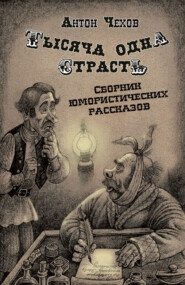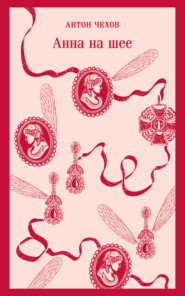По всем вопросам обращайтесь на: info@litportal.ru
(©) 2003-2025.
✖
The Lady with the Dog and Other Stories
Настройки чтения
Размер шрифта
Высота строк
Поля
"Be a good girl, and don't be depressed while I am away," he said in a warm, affectionate tone which touched even me. "God keep you!"
She looked greedily into his face, to stamp his dear features on her memory, then she put her arms gracefully round his neck and laid her head on his breast.
"Forgive me our misunderstandings," she said in French. "Husband and wife cannot help quarrelling if they love each other, and I love you madly. Don't forget me… Wire to me often and fully."
Orlov kissed her once more, and, without saying a word, went out in confusion. When he heard the click of the lock as the door closed, he stood still in the middle of the staircase in hesitation and glanced upwards. It seemed to me that if a sound had reached him at that moment from above, he would have turned back. But all was quiet. He straightened his coat and went downstairs irresolutely.
The sledges had been waiting a long while at the door. Orlov got into one, I got into the other with two portmanteaus. It was a hard frost and there were fires smoking at the cross-roads. The cold wind nipped my face and hands, and took my breath away as we drove rapidly along; and, closing my eyes, I thought what a splendid woman she was. How she loved him! Even useless rubbish is collected in the courtyards nowadays and used for some purpose, even broken glass is considered a useful commodity, but something so precious, so rare, as the love of a refined, young, intelligent, and good woman is utterly thrown away and wasted. One of the early sociologists regarded every evil passion as a force which might by judicious management be turned to good, while among us even a fine, noble passion springs up and dies away in impotence, turned to no account, misunderstood or vulgarised. Why is it?
The sledges stopped unexpectedly. I opened my eyes and I saw that we had come to a standstill in Sergievsky Street, near a big house where Pekarsky lived. Orlov got out of the sledge and vanished into the entry. Five minutes later Pekarsky's footman came out, bareheaded, and, angry with the frost, shouted to me:
"Are you deaf? Pay the cabmen and go upstairs. You are wanted!"
At a complete loss, I went to the first storey. I had been to Pekarsky's flat before – that is, I had stood in the hall and looked into the drawing-room, and, after the damp, gloomy street, it always struck me by the brilliance of its picture-frames, its bronzes and expensive furniture. To-day in the midst of this splendour I saw Gruzin, Kukushkin, and, after a minute, Orlov.
"Look here, Stepan," he said, coming up to me. "I shall be staying here till Friday or Saturday. If any letters or telegrams come, you must bring them here every day. At home, of course you will say that I have gone, and send my greetings. Now you can go."
When I reached home Zinaida Fyodorovna was lying on the sofa in the drawing-room, eating a pear. There was only one candle burning in the candelabra.
"Did you catch the train?" asked Zinaida Fyodorovna.
"Yes, madam. His honour sends his greetings."
I went into my room and I, too, lay down. I had nothing to do, and I did not want to read. I was not surprised and I was not indignant. I only racked my brains to think why this deception was necessary. It is only boys in their teens who deceive their mistresses like that. How was it that a man who had thought and read so much could not imagine anything more sensible? I must confess I had by no means a poor opinion of his intelligence. I believe if he had had to deceive his minister or any other influential person he would have put a great deal of skill and energy into doing so; but to deceive a woman, the first idea that occurred to him was evidently good enough. If it succeeded – well and good; if it did not, there would be no harm done – he could tell some other lie just as quickly and simply, with no mental effort.
At midnight when the people on the floor overhead were moving their chairs and shouting hurrah to welcome the New Year, Zinaida Fyodorovna rang for me from the room next to the study. Languid from lying down so long, she was sitting at the table, writing something on a scrap of paper.
"I must send a telegram," she said, with a smile. "Go to the station as quick as you can and ask them to send it after him."
Going out into the street, I read on the scrap of paper:
"May the New Year bring new happiness. Make haste and telegraph; I miss you dreadfully. It seems an eternity. I am only sorry I can't send a thousand kisses and my very heart by telegraph. Enjoy yourself, my darling. – ZINA."
I sent the telegram, and next morning I gave her the receipt.
IX
The worst of it was that Orlov had thoughtlessly let Polya, too, into the secret of his deception, telling her to bring his shirts to Sergievsky Street. After that, she looked at Zinaida Fyodorovna with a malignant joy and hatred I could not understand, and was never tired of snorting with delight to herself in her own room and in the hall.
"She's outstayed her welcome; it's time she took herself off!" she would say with zest. "She ought to realise that herself…"
She already divined by instinct that Zinaida Fyodorovna would not be with us much longer, and, not to let the chance slip, carried off everything she set her eyes on – smelling-bottles, tortoise-shell hairpins, handkerchiefs, shoes! On the day after New Year's Day, Zinaida Fyodorovna summoned me to her room and told me in a low voice that she missed her black dress. And then she walked through all the rooms, with a pale, frightened, and indignant face, talking to herself:
"It's too much! It's beyond everything. Why, it's unheard-of insolence!"
At dinner she tried to help herself to soup, but could not – her hands were trembling. Her lips were trembling, too. She looked helplessly at the soup and at the little pies, waiting for the trembling to pass off, and suddenly she could not resist looking at Polya.
"You can go, Polya," she said. "Stepan is enough by himself."
"I'll stay; I don't mind," answered Polya.
"There's no need for you to stay. You go away altogether," Zinaida Fyodorovna went on, getting up in great agitation. "You may look out for another place. You can go at once."
"I can't go away without the master's orders. He engaged me. It must be as he orders."
"You can take orders from me, too! I am mistress here!" said Zinaida Fyodorovna, and she flushed crimson.
"You may be the mistress, but only the master can dismiss me. It was he engaged me."
"You dare not stay here another minute!" cried Zinaida Fyodorovna, and she struck the plate with her knife. "You are a thief! Do you hear?"
Zinaida Fyodorovna flung her dinner-napkin on the table, and with a pitiful, suffering face, went quickly out of the room. Loudly sobbing and wailing something indistinct, Polya, too, went away. The soup and the grouse got cold. And for some reason all the restaurant dainties on the table struck me as poor, thievish, like Polya. Two pies on a plate had a particularly miserable and guilty air. "We shall be taken back to the restaurant to-day," they seemed to be saying, "and to-morrow we shall be put on the table again for some official or celebrated singer."
"She is a fine lady, indeed," I heard uttered in Polya's room. "I could have been a lady like that long ago, but I have some self-respect! We'll see which of us will be the first to go!"
Zinaida Fyodorovna rang the bell. She was sitting in her room, in the corner, looking as though she had been put in the corner as a punishment.
"No telegram has come?" she asked.
"No, madam."
"Ask the porter; perhaps there is a telegram. And don't leave the house," she called after me. "I am afraid to be left alone."
After that I had to run down almost every hour to ask the porter whether a telegram had come. I must own it was a dreadful time! To avoid seeing Polya, Zinaida Fyodorovna dined and had tea in her own room; it was here that she slept, too, on a short sofa like a half-moon, and she made her own bed. For the first days I took the telegrams; but, getting no answer, she lost her faith in me and began telegraphing herself. Looking at her, I, too, began impatiently hoping for a telegram. I hoped he would contrive some deception, would make arrangements, for instance, that a telegram should be sent to her from some station. If he were too much engrossed with cards or had been attracted by some other woman, I thought that both Gruzin and Kukushkin would remind him of us. But our expectations were vain. Five times a day I would go in to Zinaida Fyodorovna, intending to tell her the truth. But her eyes looked piteous as a fawn's, her shoulders seemed to droop, her lips were moving, and I went away again without saying a word. Pity and sympathy seemed to rob me of all manliness. Polya, as cheerful and well satisfied with herself as though nothing had happened, was tidying the master's study and the bedroom, rummaging in the cupboards, and making the crockery jingle, and when she passed Zinaida Fyodorovna's door, she hummed something and coughed. She was pleased that her mistress was hiding from her. In the evening she would go out somewhere, and rang at two or three o'clock in the morning, and I had to open the door to her and listen to remarks about my cough. Immediately afterwards I would hear another ring; I would run to the room next to the study, and Zinaida Fyodorovna, putting her head out of the door, would ask, "Who was it rung?" while she looked at my hands to see whether I had a telegram.
When at last on Saturday the bell rang below and she heard the familiar voice on the stairs, she was so delighted that she broke into sobs. She rushed to meet him, embraced him, kissed him on the breast and sleeves, said something one could not understand. The hall porter brought up the portmanteaus; Polya's cheerful voice was heard. It was as though some one had come home for the holidays.
"Why didn't you wire?" asked Zinaida Fyodorovna, breathless with joy. "Why was it? I have been in misery; I don't know how I've lived through it… Oh, my God!"
"It was very simple! I returned with the senator to Moscow the very first day, and didn't get your telegrams," said Orlov. "After dinner, my love, I'll give you a full account of my doings, but now I must sleep and sleep… I am worn out with the journey."
It was evident that he had not slept all night; he had probably been playing cards and drinking freely. Zinaida Fyodorovna put him to bed, and we all walked about on tiptoe all that day. The dinner went off quite satisfactorily, but when they went into the study and had coffee the explanation began. Zinaida Fyodorovna began talking of something rapidly in a low voice; she spoke in French, and her words flowed like a stream. Then I heard a loud sigh from Orlov, and his voice.
"My God!" he said in French. "Have you really nothing fresher to tell me than this everlasting tale of your servant's misdeeds?"
"But, my dear, she robbed me and said insulting things to me."
"But why is it she doesn't rob me or say insulting things to me? Why is it I never notice the maids nor the porters nor the footmen? My dear, you are simply capricious and refuse to know your own mind… I really begin to suspect that you must be in a certain condition. When I offered to let her go, you insisted on her remaining, and now you want me to turn her away. I can be obstinate, too, in such cases. You want her to go, but I want her to remain. That's the only way to cure you of your nerves."
"Oh, very well, very well," said Zinaida Fyodorovna in alarm. "Let us say no more about that… Let us put it off till to-morrow… Now tell me about Moscow… What is going on in Moscow?"
X
After lunch next day – it was the seventh of January, St. John the Baptist's Day – Orlov put on his black dress coat and his decoration to go to visit his father and congratulate him on his name day. He had to go at two o'clock, and it was only half-past one when he had finished dressing. What was he to do for that half-hour? He walked about the drawing-room, declaiming some congratulatory verses which he had recited as a child to his father and mother.
Zinaida Fyodorovna, who was just going out to a dressmaker's or to the shops, was sitting, listening to him with a smile. I don't know how their conversation began, but when I took Orlov his gloves, he was standing before her with a capricious, beseeching face, saying:
"For God's sake, in the name of everything that's holy, don't talk of things that everybody knows! What an unfortunate gift our intellectual thoughtful ladies have for talking with enthusiasm and an air of profundity of things that every schoolboy is sick to death of! Ah, if only you would exclude from our conjugal programme all these serious questions! How grateful I should be to you!"

















